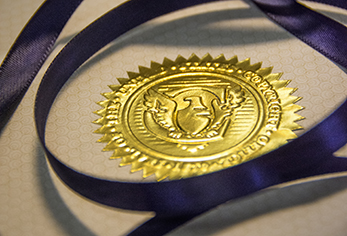
By: Jenna Herr
When exactly is copyright registration obtained for purposes of bringing a copyright infringement suit? This major circuit split question will soon be settled as the issue took center stage before the Supreme Court earlier this year.[1] In January, the Court heard oral arguments in the case Fourth Estate Public Benefit Corporation v. Wall-Street.com[2]to decide which of two approaches used by the circuits accurately reflects the meaning of the registration requirement under the Copyright Act.[3] Fourth Estate Public Benefit Corporation (hereinafter “Fourth Estate”), an online news organization, licensed articles to Wall-Street.com.[4] When Wall-Street.com cancelled its account, it failed to remove the content produced by Fourth Estate from its website, as required by their agreement.[5] Fourth Estate applied to register its copyrights in the licensed articles, and although the Copyright Office had yet to act on the applications, they moved forward with a lawsuit against Wall-Street.com alleging copyright infringement.[6]
Although copyright registration is voluntary, Congress has created incentives for a copyright owner to pursue registration, one being the right to enforce a copyright in an infringement action.[7] 17 U.S.C. § 411 states that a precondition to filing suit for copyright infringement is registration of a copyright.[8] However, the circuits have been divided on when the term “registration” is satisfied, historically taking one of two approaches: application or registration.[9] The Fifth and Ninth Circuits adhere to the application approach, claiming that registration occurs when a copyright owner has “filed the deposit, application, and fee required for registration,” and a plaintiff may file an infringement action regardless of whether the Copyright Office has taken official action on the application.[10] However, according to the registration approach used by the Tenth and Eleventh Circuits, plaintiffs must wait longer before taking action against an alleged infringer. Under this theory, the required registration does not occur until the Copyright Office has acted on the application, whether it be approving or denying it.[11] In the current case before the Supreme Court, the Court of Appeals for the Eleventh Circuit took the latter approach and dismissed the case, relying on the plain language of the Copyright Act.[12]
The Supreme Court agreed to weigh in on the issue, ending a circuit split dating back at least 30 years.[13] Due to the inconsistency in this area of copyright law, parties have either had the green light to bring, or faced obstacles in bringing, a lawsuit for infringement at different points in the registration process solely depending on where the suit is filed. Although the Court has yet to issue a decision, industry experts have anticipated that the registration approach will prevail.[14] The Copyright Office, in its amicus brief to the Court, relied on the text and structure of the statute to support the registration approach, stating “the term ‘registration’ signified (and signifies) an authoritative act of ‘[r]ecording’ or ‘inserting in an official register’”.[15]
If the Supreme Court sides with the registration approach, it will not only eliminate uncertainty among the circuits but it will likely increase the number of applications in copyrights, incentivizing owners to act quickly in obtaining a determination by the Copyright Office. Some have also predicted a likely reduction in the number of infringement claims due to the obstacle of obtaining an official registration certificate.[16] However, siding with the registration approach would also create a state of limbo for copyright holders, leaving them unable to seek remedies before Copyright Office action which takes, on average, eight months.[17] On the other hand, a ruling in favor of the application approach would obviously reduce the hurdles to enforcing a copyright, but would also disincentive proactive registration.[18] Regardless of the Supreme Court’s decision, copyright owners can look forward to much-needed uniformity in commencing copyright litigation.
[1]Fourth Estate Pub. Benefit Corp. v. Wall-Street.com, No. 17-571 (argued Jan. 8, 2019).
[2]Id.
[3]Id.
[4]Fourth Estate Pub. Benefit Corp. v. Wall-Street.com, 856 F.3d 1338, 1339 (11th Cir. 2017).
[5]Id.
[6]SeeSamuel Elchner, Margaret Esquenet, & Naresh Kilaru, Supreme Court Grans Certiorari in Fourth Estate To Resolve Circuit Split on Copyright Registration Prerequisite To Suit, Finnegan (Oct. 4, 2018), https://www.mondaq.com/unitedstates/x/742310/Copyright/Supreme+Court+Grants+CertiCerti+In+Fourth+Estate+To+Resolve+Circuit+Split+On+Copyright+Registration+PrereqPrereq+To+Suit.
[7]Katie Scholz, Litigating Copyrights: Is Registration required to get into Court?,IP Watchdog(Aug. 15, 2018), https://www.ipwatchdog.com/2018/08/15/litigating-copyrights-is-registration-required/id=100130/.
[8]17 U.S.C. § 411(a).
[9]SeeFish & Richardson, Supreme Court to Resolve Copyright Registration Circuit Split, JDSupra (July 2, 2018), https://www.jdsupra.com/legalnews/supreme-court-to-resolve-copyright-61921/.
[10]Id.
[11]Elchner et al.,supranote 6.
[12]Fourth Estate Pub. Benefit Corp. v. Wall-Street.com, 856 F.3d 1338, 1341 (11th Cir. 2017)
[13]SeeAngelique McCall, US Supreme Court Tackles Copyright Registration Circuit Split, Brackett & Ellis, P.C.(Oct. 5, 2018), https://www.belaw.com/us-supreme-court-tackles-copyright-registration-circuit-split-2/;compareApple Barrel Products Inc. v. Beard, 730 F.2d 384 (5th Cir. 1984) (using the application approach), with M.G.B. Homes v. Ameron Homes Inc., 903 F.2d 1486 (11th Cir. 1990) (using the registration approach).
[14]Elchner et al.,supranote 6.
[15]Brief for the United States as Amicus Curiae at 13, Fourth Estate Pub. Benefit Corp. v. Wall-Street.com, No. 17-571 (U.S. Jan. 2019).
[16]Anthony J. Dreyer, Jordan Feirman, & David M. Lamb, Supreme Court to Clarify What Constitutes a ‘Registration’ Under the Copyright Act, Skadden (June 29, 2018), https://www.skadden.com/insights/publications/2018/06/scotus-to-clarify-what-constitutes-a-registration
[17]Id.
[18]See Sean M. Callagy, United States Supreme Court to Tackle Copyright Registration Debate, Arnold & Porter(July 9, 2018), https://www.arnoldporter.com/en/perspectives/publications/2018/07/us-supreme-court-to-tackle-copyright-registration.


